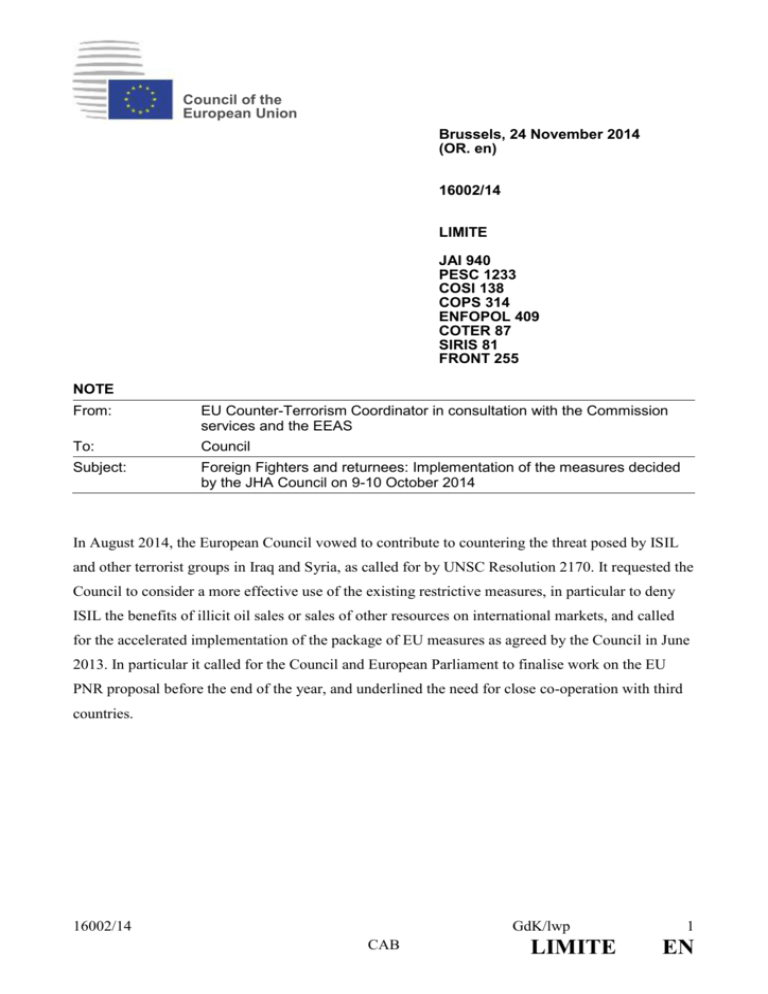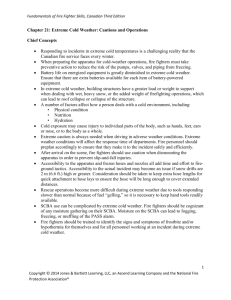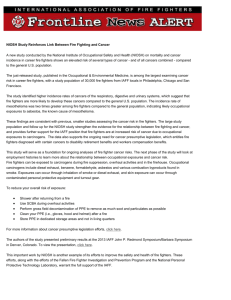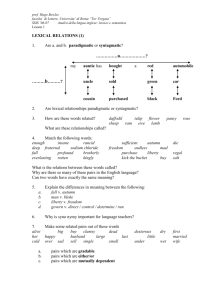CSL-ForeignFighters
advertisement

Council of the European Union Brussels, 24 November 2014 (OR. en) 16002/14 LIMITE JAI 940 PESC 1233 COSI 138 COPS 314 ENFOPOL 409 COTER 87 SIRIS 81 FRONT 255 NOTE From: To: Subject: EU Counter-Terrorism Coordinator in consultation with the Commission services and the EEAS Council Foreign Fighters and returnees: Implementation of the measures decided by the JHA Council on 9-10 October 2014 In August 2014, the European Council vowed to contribute to countering the threat posed by ISIL and other terrorist groups in Iraq and Syria, as called for by UNSC Resolution 2170. It requested the Council to consider a more effective use of the existing restrictive measures, in particular to deny ISIL the benefits of illicit oil sales or sales of other resources on international markets, and called for the accelerated implementation of the package of EU measures as agreed by the Council in June 2013. In particular it called for the Council and European Parliament to finalise work on the EU PNR proposal before the end of the year, and underlined the need for close co-operation with third countries. 16002/14 GdK/lwp CAB LIMITE 1 EN In response to this, the Council in its meeting on 9-10 October 2014 discussed and endorsed a number of measures and asked the CTC, in close collaboration with the services of the Commission and the EEAS, to submit a report to the December Council in which progress is assessed and where appropriate suggestions for the Council to decide about further work will be made1. This paper prepared in consultation with the Commission services and the EEAS, as well as Europol and Eurojust, takes stock of the considerable efforts and progress made since October, notably by the Presidency who addressed different measures in the relevant working groups in the past weeks. Ministers are invited to take note and support further work in these areas in order to accomplish the goals set out earlier. 1. PREVENTION OF RADICALISATION Reducing the flow of individuals who may depart to Syria or Iraq to participate in fighting remains a challenge. Given that many foreign fighters are attracted by the huge amount of extremist and terrorist propaganda on the Internet and social media, the EU and its Member States have to join efforts on this. On 8 October, the Commission invited the 28 Ministers of Interior of the EU Member States and high level representatives from Google, Facebook, Twitter and Microsoft to deepen their existing dialogue on ways to confront online radicalisation. Discussions focused on the challenges in the area of internet and counter terrorism, the steps interested parties are taking, and opportunities for closer cooperation. Given the role of social media in the recruitment of foreign fighters – and ISIL's sophisticated use of social media for offensive propaganda – this initiative should be built upon and expanded as a matter of priority. Member States will play a key role in taking this work forward at national level. It is welcome that the Commission has the intention to pursue the engagement with industry counterparts e.g. through joint training, awareness raising and workshops for the representatives of the law enforcement authorities, internet industry and civil society. 1 doc. 14160/14 16002/14 GdK/lwp CAB LIMITE 2 EN The Commission has proposed establishment as early as possible of a Forum with representatives from the EU institutions, Member States and industry counterparts to identify effective ways and means to enhance European capacity to ensure the removal of illegal content. This should be encouraged. Many sites simply host illegal content. This should be removed as a matter of priority. Member States take a differentiated approach to addressing sites of concern that are hosted within their jurisdictions. We should ask Eurojust to analyse these different frameworks, sharing Member States' legislative experiences and identifying good practice in this regard. The UNODC report 'The use of the Internet for terrorist purposes' provides a useful input in this regard. Several Member States have established units to identify and rapidly take down sites of concern in line with their domestic legislation, such as the UK's CT Internet Referral Unit (CTIRU). Other Member States such as the Netherlands and France have in place national systems which pursue the same overall goals while following somewhat different approaches. It is recommended that these different approaches are examined so as to identify ways and means for interested Member States to replicate this work as appropriate, sensitive to local context and domestic legal frameworks. Many of these sites of concern, however, address multiple audiences across jurisdictions. We should therefore also consider establishing a European level capability to amplify the work of Member States in this area, and provide a pan-European response. Such an European endeavour should be staffed jointly by public and private sector representatives to build mutual understanding and ensure an effective and efficient response (including identifying additional initiatives to facilitate removal of illegal content). The work of the European Joint Initiative on Internet and Counter Terrorism (EJI-ICT) led by the Netherlands is important in this regard as one of its goals is to develop joint policies towards - and working together with - the industry to reduce the amount of online terrorist content using a range of tools, including law-enforcement driven measures. 16002/14 GdK/lwp CAB LIMITE 3 EN Strategic communications and counter-narratives Many sites, however, may indirectly promote the terrorist narrative and may be repugnant, but do not break the law. These must be addressed through providing counter-narratives, and ensuring that they have the profile - and are produced in sufficient volume - to counter the appeal of the terrorist narrative. The Commission's decision to grant €1m to assist Member States in the area of CT-related strategic communications is to be warmly welcomed. The creation of the EU Syria Strategic Communications Advisory Team (SSCAT), with a view to gathering, exchanging and making available expertise to Member States and EU bodies, is a very positive development. EU SSCAT presents us with a good opportunity to address this challenge. We should encourage MS join the EU SSCAT network and utilise its experience and expertise: the initiative will only be successful insofar as it is employed. Finally, implementation of the EU's revised Strategy to Combat Radicalisation and Recruitment should be accelerated. Guidelines are about to be adopted and should be taken forward as a matter of urgency. In particular, the Commission will shortly launch the process to establish a PreventRAN Centre of excellence to provide expert resources for all Member States: this should be actively supported. Work of the RAN Centre of excellence should focus in particular on assisting Member States in setting up practical counter-radicalization and/or disengagement projects, including related to the internet, and in sharing practices and methodologies with regard to the re-integration and rehabilitation of returnees from a social perspective. 16002/14 GdK/lwp CAB LIMITE 4 EN 2. IDENTIFICATION AND DETECTION OF TRAVEL Following the paper of the Italian Presidency to the JHA Council2 in October, the Council agreed on a number of measures3, which are in the process of being implemented. 1. EU PNR The JHA Council clearly indicated its resolve and determination to revive the discussion on EU PNR with the European Parliament. The Commission is engaged with MEPs, in particular from the LIBE Committee. Member States should also engage with the national MEPs to this end. It is also very important that evidence based information is made available to EP on the security necessity of the EU PNR. The Commission is working towards facilitating this process. The Director of Europol engaged with the LIBE Committee on counter-terrorism issues advocating for the establishment of an EU PNR. 2. Explore possibilities for sharing API data on internal EU flights and to reflect on the appropriate legal framework for this exchange. The UK presented a paper4 at the COSI meeting on 10 November 2014. There was no consensus to move forward on this issue at this stage. 3. To complete ongoing work with a view to a common interpretation of the Schengen Borders Handbook regarding the circumstances of non-systematic checks on persons and to develop common risk indicators for non-systematic checks. Non-systematic checks of persons databases were addressed in meetings organised by the Commission on 17 October and 10 November 2014 with experts of Member States, in SCIFA/Mixed Committee on 14 November 2014 and in the Frontiers Working Party/Mixed Committee on 31 October. 2 3 4 doc. 13416/1/14 REV 1 Foreign fighters: follow-up on the Conclusions of the European Council of 30 August 2014, doc. 14160/14 of 13 October 2014 DS 1335/14 16002/14 GdK/lwp CAB LIMITE 5 EN In the Frontiers Working Party on 19 November 2014, Member States discussed a Commission non-paper5 with informal recommendations on a common approach / interpretation based on risk assessment regarding checks of persons enjoying the right of free movement under EU law (article 7(2) of the Schengen Borders Code). These recommendations could allow for more frequent checks of persons based for example on travel patterns or other risk indicators. Member States agreed that there was no need to amend the Schengen Borders Code to achieve increased checks of persons enjoying the right of free movement, but that a common interpretation of the existing provisions was necessary. Once a consensus on the approach/interpretation is established, the question of whether to amend the Schengen Handbook will be discussed. It is important to seize the Commission's willingness to facilitate, in close cooperation with the Member States and relevant EU agencies and bodies, the development of common risk indicators for non-systematic checks of persons. This would allow more homogeneous checks at Member States ' borders and would therefore contribute to an equal level of borders controls at external borders. 4. To reinforce systematic controls of the validity of travel documents against the relevant databases such as Interpol's SLTD as well as the document section of the SIS through the establishment by Member States, supported as appropriate by the EU, of technological and procedural requirements. The Council adopted conclusions on strengthening the use of Interpol's Stolen and Lost Travel Documents (SLTD) database6 (13525/14) at its meeting on 8-9 October 2014. Systematic checks of data bases related to the validity of travel documents were addressed in meetings organised by the Commission on 17 October and 10 November 2014 with experts of Member States, in SCIFA/Mixed Committee on 14 November 2014 and in the Frontiers Working Party/Mixed Committee on 31 October. 5 6 Subsequently issued as document 15876/14 doc. 13525/14 16002/14 GdK/lwp CAB LIMITE 6 EN In the Frontiers Working Party on 19 November 2014, Member States discussed a Commission non-paper7 with informal recommendations on more systematic consultation of relevant databases when checking the validity of travel documents. The controls of the validity of travel documents by the Member States are mainly based on national risk assessments. Currently, technical issues prevent the Member States to perform a systematic check of validity of documents at external borders. Amongst them: some Member States experience long connection delays which prevent them from carrying out systematic checks of travel documents without impacting the flows of passengers; existing technical solution to carry out searches in databases which leads to automatic check of travel document and the person at the same time; some travel documents do not have a Machine Readable Zone (MRZ) and hence cannot be checked against databases unless entered manually which would impact the flows of passengers. The EU could support, as appropriate, Member States' initiatives to establish appropriate technological and procedural requirements. 5. Make recommendations on the implementations of the conclusions of the meeting in Milan regarding the use of SIS. The SIS/VIS Committee of the Commission has recently addressed this. The Commission is expected to adopt an implementing act amending the SIRENE Manual soon. The Working Party for Schengen Matters (SIS/SIRENE) at its meeting on 10 November 2014 examined a set of draft recommendations8, and the Presidency aims at reaching agreement at the meeting of the Working Party on 18 December 2014. Information was also provided on the issue at SCIFA/Mixed Committee on 14 November 2014. 7 8 Subsequently issued as document 15876/14 doc. 14523/1/14 REV 1 16002/14 GdK/lwp CAB LIMITE 7 EN 6. Europol to provide figures for the contributions of Member States and third countries to its Focal Point Travellers. In its report to the Council, Europol will provide figures about contributions to Focal Point Travellers. Despite considerable progress, contributions could further increase to fully reflect the scale of the phenomenon. Thanks to Europol's "handling code" policy, Member States retain full control over the information they provide. The process of association has been completed with regard to Switzerland and Norway in October and November 2014. The association of Australia and the US Custom and Border Protection Service (CBP) is at an advanced stage and the association of Serbia and the Former Yugoslav Republic of Macedonia are being considered. With regard to foreign fighters, Working Group DUMAS was established, had its kick-off meeting in October 2014 and its first operational meeting in November 2014. It is led by Italy and supported by Europol. Activities on which the working group will focus are: travellers alert list (co-driver Austria), outreach (co-driver Hungary, Spain), best practice (co-driver France, UK), indicators (codriver Germany, Luxembourg), facilitators (co-driver Spain, UK). In addition, Europol is carrying out a feasibility study to explore whether the technology Ma3tch used for the EU network of Financial Intelligence Units (FIU.net) - dynamic network rather than collection of data, virtual integration, anonymization etc9 - could be used in the Europol context. It is desirable that partners such as the US Custom and Border Protection Service and Interpol, as well as Eurojust are provided access to Focal Point Travellers as soon as possible, so that they can also contribute. 9 See Udo Kroon, CIO FIU.Net, Ministry of Security and Justice, The Netherlands, udo.kroon@fiu.net, "Ma3tch: Privacy AND Knowledge 'Dynamic Networked Collective Intelligence'," 2013 IEEE International Conference on Big Data 16002/14 GdK/lwp CAB LIMITE 8 EN 7. Europol and Frontex to conclude an agreement on sharing of personal data. Both agencies concluded negotiations on a draft agreement on 14 November 2014. The agreement will be submitted to the respective management boards of both agencies in the coming weeks for subsequent transmission to the data protection authorities for their opinion. 8. Invited Europol to further reinforce its cooperation with Interpol Interpol participates in relevant meetings at Europol. Europol provides relevant information to Interpol as appropriate. Interpol has contributed a list of foreign fighters to Europol. On 28 October 2014, Interpol officially requested to be associated to Focal Point Travellers and Europol has informed participating Member States of the request. Participation of third parties in the Focal Point requires unanimous decision on the part of the Member States. 9. Explore possibilities to reinforce the analytical capacities of Interpol's fusion centre on foreign fighters and promote a more systematic use of its diffusion system. Interpol presented its Fusion Task Force (FTF) (DS 1480/14) at the COSI meeting on 10 November 2014 and called for Member States' support. Interpol highlighted that additional resources were necessary to create a dedicated analytical capability on foreign fighters which would be of interest to member countries. Additional resources would also step up INTERPOL support to operational activities related to foreign fighters. It was stressed that synergies need to be explored with other existing channels such as Europol's Focal Point 'Travellers. Interpol indicated that the use of diffusions (where States have control over which countries receive the information) has increased considerably over the past year. However, the number of diffusions (currently 820) does not yet reflect the extent of the foreign fighters problem. Interpol has developed an initiative called "i-check it" with Air Asia and Qatar Airways. It allows the air carriers to check the validity of passports of travellers against the Interpol SLTD database and has already let to the refusal of boarding of 18 passengers in four months because of stolen passports. 16002/14 GdK/lwp CAB LIMITE 9 EN The December workshop organized by Interpol in Spain will help define the needs which should lead to a strengthening of Interpol in the context of addressing the foreign fighters phenomenon. 10. Strengthen the use of multi-national ad-hoc teams for gathering and exchanging information on terrorism. The Presidency has submitted a proposal10 outlining guidelines for establishment of a Multinational Ad Hoc Team, consisting of a network of contact points with expertise on the phenomenon of foreign fighters, to be set up at Europol among the countries concerned and on a strictly voluntary basis. Following the first exchange of views at the Terrorism Working Party meeting on 18 November 2014, the Presidency will further explore the possibilities for setting up of a cooperation structure at Europol to help address the issue of foreign fighters. In addition to work initiated following the JHA Council in October 2014, a number of other initiatives have been taken both by the EU and the Member States that are relevant in the context of the detection of foreign fighters. A number of Member States have set up their own Passenger Information Units to collect and exchange passenger data, with Commission financial support. This initiative should be built upon, and all Member States should look to develop this capability, which would help identify travel patterns to/from Syria and Iraq, as well has help identify persons of concern. Interconnectivity between these units is not yet foreseen but would be necessary. Given the continued attractiveness of civil aviation to terrorist groups and the increased threat to aviation security from some groups and individuals in Syria and Iraq, Member States and the Commission are examining whether current aviation security standards remain adequate, in particular against the threat posed by conventional and home-made skilfully concealed explosives and encourage the Commission and Member States. The Commission and Member States are pursuing their detection trials and sharing information aimed at strengthening the preventive detection of CBRN-E threats against aviation. 10 DS 1532/14 Terrorism Working Party 16002/14 GdK/lwp CAB LIMITE 10 EN The Terrorist Financing Tracking Programme (TFTP) plays a vital role in the support of EU and third States' counter-terrorism investigations. The use of the program is continually promoted by Europol’s TFTP unit. For the first time is currently a TFTP case example was referenced in Europol’s 2014 Terrorism Situation and Trend Report (TE-SAT). TFTP is also being actively used in investigations related to the foreign fighters phenomenon and Member States should continue to make full use of the TFTP. Recent UNSC Resolutions 2161, 2170 and 2178 reaffirm, among other measures, the importance of a full and effective use of the UN Sanctions regime established under UNSC Resolution 1267 and subsequent resolutions by all UN member states with special regard to foreign fighters. In order to disrupt recruitment and facilitation, UN listing of all known individuals who facilitate travel of and recruit foreign fighters would be crucial but has not yet reached its maximum potential. 3. CRIMINAL JUSTICE RESPONSE UNSC Resolution 2178 requires all States to criminalize travel or attempt to travel for the purpose of the perpetration, planning, or preparation of, or participation in, terrorist acts, or the providing or receiving of terrorist training; financing of such travel; organisation, or other facilitation, including acts of recruitment, of such travel. The JHA Council of October 2014 invited the Commission, also in light of the adoption of the UNSC Resolution 2178(2014), to further monitor the effectiveness of the responses provided under the Framework Decision, and explore ways to address possible shortcomings, based on the implementation report adopted in September 2014, the report produced by Eurojust, and any relevant information. 16002/14 GdK/lwp CAB LIMITE 11 EN In this respect, on 23 October 2014, on the basis of a paper drafted by the CTC11, CATS held a first discussion on how to provide an effective criminal justice response to the phenomenon of foreign fighters. A majority of delegations informed that they are evaluating their national legislation in the light of the requirements of the UNSC Resolution. Some Member States have already adopted new legislation specifically designed to address the phenomenon of foreign fighters. As a follow-up to this discussion, at CATS on 11 November 2014, the Presidency invited delegations to submit information about the existing national measures that are already in compliance with the requirements of the operative paragraph 6 (OP 6) of the UNSC Resolution, or that have been adopted in implementation of OP 6, or to inform about their plans to do so. In the course of those discussions, Member States referred to the upcoming Eurojust Report on this issue, which had been requested by the JHA Council of October 2014, as an useful tool in order to assess adequately the necessity to further review in this respect the existing Council Framework Decision 2002/475/JHA on combating terrorism, as amended by Framework Decision 2008/919/JHA . Eurojust can play an important role to facilitate international legal cooperation with regard to foreign fighters cases both within the EU and with third countries. Eurojust should be systematically involved in cases related to foreign fighters, including recruitment, facilitation and funding. Setting up Joint Investigation Teams could be considered by Member States where appropriate in such cases. Eurojust can play an important role with regard to sharing of best practices and exchange of expertise. Eurojust can contribute to the discussion on the optimal strategies to strengthen a common judicial approach to the foreign fighters phenomenon. Analysis and compilation by Eurojust of information related to trials and convictions of foreign fighters is useful to achieve an overview over the judicial response across the EU. Member States should be encouraged to make optimal use of the possibilities for exchange of information on prosecutions and convictions with Eurojust, as set out in Council Decision 2005/671/JHA of 20 September 2005 on the exchange of information and cooperation concerning terrorist offenses. 11 doc. 14188/14 16002/14 GdK/lwp CAB LIMITE 12 EN Challenges identified by Eurojust include the gathering of evidence in conflict zones and the use of internet based evidence, which includes technical complexities, and international judicial cooperation, which needs to be stepped up. A liaison prosecutor from Switzerland will take post at Eurojust in 2015. Eurojust has strengthened its cooperation with the Western Balkans countries over the past couple of months: Contact points were established, Eurojust organized a training session to explain its role in counter-terrorism, Western Balkans countries participated in the June 2014 Eurojust tactical meeting on foreign fighters. Further possibilities for counter-terrorism cooperation were identified at a meeting between Eurojust and the contact points in October 2014 such as to help each other to identify relevant counter-terrorism practitioners, to establish an active counter-terrorism experts network among practitioners from the region and Eurojust, to exchange information, expertise and legal developments and trends. Eurojust can assist the Member States in preparing Mutual Legal Assistance requests using, where appropriate, the support of the Eurojust contact points in Turkey. A number of Member States have adopted or are in the process of adopting administrative measures to prevent or disrupt travel, such as confiscation of passports, withdrawal of citizenship, deprivation of social benefits, etc. It would be interesting to compare experiences and impact of these measures as soon as possible. During the most recent seminar in November 2014 in Brussels in the context of the project "Judicial response to terrorism in the EU: Strengthening cooperation to better prevent and react", implemented by the French Ecole Nationale de la Magistrature in cooperation with the Institut de formation judiciaire (Belgium) and the Centro de Estudios Jurídicos (Spain), challenges regarding the trials of foreign fighters were also discussed, including the importance of development of rehabilitation and de-radicalization programmes in the judicial context with regard to foreign fighters. 16002/14 GdK/lwp CAB LIMITE 13 EN Switzerland has commissioned a recently published study "Foreign Fighters under International Law" by the Geneva Academy (Academy Briefing No. 7, October 2014), which explores the various international law aspects relevant to foreign fighters, including the relationship to international humanitarian law. One of the findings of the study is that foreign fighters do not enjoy combatant immunity because the conflicts in Syria and Iraq are non-international in character and can therefore be prosecuted under national criminal law, including for acts which are lawful under IHL. It also expresses concerns about blurring the lines between the law governing armed conflicts and the law governing terrorism. 4. CO-OPERATION WITH THIRD COUNTRIES On 20 October 2014 the Foreign Affairs Council adopted a counter-terrorism/foreign fighters strategy regarding Syria and Iraq. It is important to implement the strategy without delay, including supporting capacity-building initiatives in the region. Counter-radicalisation and counter-terrorism strategic communications work in Syria and Iraq and the wider region are priorities for action, alongside improving the effectiveness of border and aviation security in priority partner countries. The 2010 Yemen plot highlighted the challenges related to detection with regard to cargo. The recent tablet computer threats originating from third countries illustrate the challenges of detection related to passengers in third countries. The CT/foreign fighters strategy is an integral part of the wider 'EU Regional Strategy for Syria and Iraq as well as the ISIL/Da'esh threat' under preparation that the Foreign Affairs Council asked the High Representative / Vice President to develop. 16002/14 GdK/lwp CAB LIMITE 14 EN The EU and its Member States made clear their determination to strengthen further security and counter-terrorism cooperation, as well as related political dialogue and engagement with third countries, especially with Turkey. In October, the CTC, EEAS and Commission conducted a joint visit to Turkey. Developments have occurred since April (dramatic surge of ISIL, spill over to Iraq and Lebanon, Kobane, further flow of refugees to Turkey and of foreign fighters to Syria and Iraq. The EU side offered assistance to Turkey in particular in the areas of aviation security, document security and counter-radicalisation and discussed ways to improve information sharing on foreign fighters. In October 2014, the CTC visited Lebanon to be briefed on the threat and the situation on the ground. In November 2014, the CTC and the EEAS visited Baghdad and Erbil in Iraq in order to engage with the new inclusive government, get a better understanding on the threat and the situation on the ground and explore areas for CT cooperation. EU engagement with partners such as the United States, Australia, Canada and Schengen partners Norway and Switzerland is important as well to share best practice and coordinate our response. These issues were addressed in detail at the EU-Australia CT Political Dialogue on 6 November, the EU-US Justice and Home Affairs Ministerial on 12/13 November and the EU-US CT Political Dialogue on 12 November. The US Special Presidential Envoy for the Global Coalition to Counter ISIL, General Allen, had an exchange with the PSC in October 2014, stressing the importance of the EU's contribution to several strands of the anti-ISIL coalition, highlighting in particular the work on foreign fighters and financing. The EU-Jordan Association Council on 9 October proposed establishing a security dialogue with Jordan in order to help pave the way for enhanced security and CT co-operation. A number of concrete avenues for capacity-building in third countries have been identified and work is ongoing to translate them into projects under the various financial instruments. 16002/14 GdK/lwp CAB LIMITE 15 EN Western Balkans On 16-17 October 2014 the Commission and the EEAS organised, together with the US, a workshop on PREVENT/foreign fighters held in Ljubljana. The workshop involved public authorities and civil society from the countries in the Western Balkans and Member States as well as US authorities. A set of recommendations (focusing on law enforcement and intelligence; judicial cooperation; the role of civil society and frontline actors; and science and research) were made which will pave the way for future actions on PREVENT, including foreign fighters, in the Western Balkans region. As a next step, specific projects have to be identified to put the strengthening of capabilities through the recommendations in practice. In addition, the Commission has issued a call for proposals under the Internal Security Fund (for € 3 m) that will also be available to Western Balkans beneficiaries, provided that the proposal includes a minimum of two EU MS as beneficiaries. The model of this successful workshop on foreign fighters, including TAIEX funding, could also be used also elsewhere, e.g. in Jordan, Lebanon, Tunisia or Turkey. Parallel to these developments Slovenia has set-up an initiative in the context of the Terrorist Working Party to strengthen the counter terrorism capabilities of Western Balkans countries. The initiative aims to create synergy between existing efforts in the Western Balkans, analyse what needs there are and consequently which gaps there might still be in the EU approach and eventually developing a list of activities within a roadmap with a clear timeframe for implementation. To start this exercise Slovenia has set up an informal support group for the initiative in which Member States as well as EU institutions are represented. MENA region: A first package of proposed measures under the IcSP short term, which includes support in MENA countries to address the foreign fighters threat will be presented to the PSC at the end of November 2014. The projects could start in early 2015. The package includes the following project proposals: 16002/14 GdK/lwp CAB LIMITE 16 EN - A Task Force will be established to provide assistance to interested partner countries in the MENA region on the design and implementation of strategic communications and counternarrative campaigns to address the threat of ISIL and stem the flow of foreign fighters. In parallel, a BBC Media Action project will be supported in Syria aimed at increasing dialogue about and resilience against extremist narratives. Small scale initiatives in Syria in the region will receive assistance to strengthen resilience and promote non-sectarianism (€ 6,5 m). - Support to refugees in Turkey: The project is aimed at strengthening the resilience of host communities and facilitating integration of Syrian refugees in Turkey (€17m). The project will support refugee registration, basic services delivery and work opportunities. Community centres will be supported to function as platforms for the provision of essential services to refugees. Options are being explored to include activities aiming at countering radicalisation in the context of supporting community centres. MENA: Under the European Neighbourhood Instrument, the Commission is developing a € 5m project to be implemented by UNODC in cooperation with UNCTED, to strengthen the legal regime/ the criminal justice response of the countries in the MENA region against foreign fighters (in particular legal framework, investigations and prosecutions, international cooperation). This major project will be fast-tracked and could start in February 2015. Under the IcSP long-term, the Commission has launched an Identification and Formulation Study for a proposed €11m CT capacity building programme in the MENA region. One focus will be addressing the foreign fighter threat in view of implementation of UNSCR 2178 (2014). As the preparatory procedure takes time, the project would start end 2015. In addition, the EU support on CVE foreseen for the Hedayah Centre and GCERF (€7 million total) should, in time, allow for activities in the MENA region as well. 16002/14 GdK/lwp CAB LIMITE 17 EN The Commission, with support of the EEAS, was requested by the last JHA Council to report on the modalities of future aviation and airport security assessment missions by members of the EU expert networks (Airpol, EEODN, Atlas etc) to countries neighbouring Syria and Iraq. These visits could be a first step towards enhancing broader co-operation on aviation and border security with countries such as Turkey, Lebanon and Jordan. Aviation is a particular priority given the proliferation of the AQAP design for a non-metallic detonator and other improvised explosive devices, as well as increased use of MANPADS in the Middle East. An action of 7 Million Euros under IcSP long term will carry out related activities in the region. Iraq: An 11 Million Euro rule of law project has started in September 2014, focusing on police, justice and prisons, i.a. rehabilitation (Development Cooperation Instrument). CT aspects will be covered in the project, for example assistance to the reform of the CT law, which causes grievances in the Sunni community. As a follow up to the visit by the CTC and the EEAS, further CT support to Iraq is under consideration. Additional proposals addressing the foreign fighters threat are under preparation by EEAS and the Commission with regard to Tunisia and counter-radicalization work in Jordan. On 25-27 November, the Commission (DEVCO) is organising an event on foreign fighters in Brussels, along with the Swiss government and CTED, in which EU Member States and countries in the Western Balkans, Middle East and North Africa will participate. Focus of the discussion will be on operational and legal measures to address the threat posed by foreign fighters. This conference will link into the identification of the IcSP long term CT MENA action. In addition to the country visits, the CTC chaired the second informal meeting on foreign fighters with Euromed countries. The meeting was co-organised with Morocco and with the support of the EEAS and the Commission. Participating countries indicated following areas as possible fields of cooperation with the EU: use of social media for terrorist purposes, border control and border management, counter-radicalisation, terrorist financing, information exchange and exchange of best practices. 16002/14 GdK/lwp CAB LIMITE 18 EN Cooperation within the Global Counter Terrorism Forum, in particular the Dutch-Moroccan-led Working Group on Foreign Terrorist Fighters, remains important as well. The next meeting of the Working Group, which has now been formally established, will take place in Marrakech on 15-16 December 2014. A joint GCTF-UNICRI workshop on 'Reintegrating Returning "Foreign Terrorist Fighters," Lessons from the Rome and The Hague-Marrakech Memoranda' will be held in Rome on 11-12 December 2014. Financing of ISIL Groups such as AQ and their affiliates still use 'traditional' funding sources such as individual donors, (legitimate and illegitimate) business activities, organized crime, kidnapping for ransom and the abuse of charities and other non-profit organisations. ISIL adds to this the proceeds of holding territory and controlling natural and cultural resources. This changes and challenges the way in which we need to approach their finances. It is necessary to map, assess and disrupt financial flows to terrorist organisations operating in Syria and Iraq. Effective implementation of the existing restrictive measures by all UN Member States is crucial to deny ISIL (a listed entity under the UN Al Qaida Sanctions regime) the benefits of illicit oil sales and sales of artefacts and other resources on international markets as well as the benefits of kidnapping for ransom, extortion and other criminal acts. The EU needs to reach out to the relevant third countries in this regard. Capacity building opportunities to third countries on terrorist financing should be explored. Pursuant to UNSC Resolution 2170 the UN Al Qaida Analytical Support and Sanctions Monitoring Team issued a report on 14 November 2014 on ISIL and the Al-Nusrah Front giving 10 recommendations for further action of the UN Security Council including on ISIL sources of arms and funding. 16002/14 GdK/lwp CAB LIMITE 19 EN On 17 October 2014, the US hosted a meeting of the International Working Group on Sanctions Targeting ISIL, al-Nusrah Front (ANF), and the Assad regime. Twenty-one countries and organizations including the EU discussed opportunities to implement targeted measures to financially isolate these groups and the Assad regime from the international financial system and to undermine their ability to finance campaigns of violence and terrorism. Focus of the meeting was i.a. the denying of benefits from oil production and sales, the need of continued and timely information sharing and the importance of minimizing the civilian consequences when targeting finances. The system used in Mexico which put caps on cash transactions and put restrictions on its banks to address narcotics trafficking in US dollars, was identified as a potential model moving forward. The connection of the ISIL economy to the international financial market needs to be avoided. This, and other challenges, was discussed during a conference organised by the Bahrain government in Manama on 9 November 2014. The EU, as well as several EU Member States, participated in this conference. The declaration adopted after the conference calls on states to implement all relevant UNSC Resolutions, as well as fully and effectively implement the FATF recommendations relevant to terrorism financing and stresses i.a. the need for international and regional cooperation and the continuing analysis of the phenomenon of terrorism financing through i.a. typology studies to identify and better understand certain methods of terrorism financing and fundraising. Some terrorist fundraising techniques that deserve increased attention from Member States in light of the current threat are: self-generated funds by operating in ungoverned spaces and exploiting natural and cultural resources; fundraising through the internet and social media; abuse of charities and non-profit organisations; the usage of electronic payment systems. The Political and Security Committee will have a discussion on Syria/Iraq/ISIL ahead of the Foreign Affairs Council in December. An informal meeting of the PSC, hosted by Austria, with civil society experts to discuss the impact, organisation, operation, financing and equipment of ISIL and possible EU counter measures is also foreseen. 16002/14 GdK/lwp CAB LIMITE 20 EN





